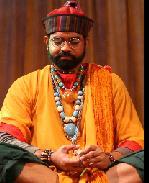SITE GUIDE
SEARCH
REVIEWS
REVIEW ARCHIVES
ADVERTISING AT CURTAINUP
FEATURES
NEWS
Etcetera and
Short Term Listings
LISTINGS
Broadway
Off-Broadway
NYC Restaurants
BOOKS and CDs
OTHER PLACES
Berkshires
London
California
New Jersey
DC
Philadelphia
Elsewhere
QUOTES
TKTS
PLAYWRIGHTS' ALBUMS
LETTERS TO EDITOR
FILM
LINKS
MISCELLANEOUS
Free Updates
Masthead
Writing for Us
A CurtainUp Review
Three Travelers
|
You were expecting us and here we are,
three travelers on a spiritual mission.
.—-Mavis
|

Kenneth Maharaj as the Guru
(Photo: Gerry Goodstein)
|
Three Travelers is deftly directed by Jay Broad and features Stephen Schnetzer as Travis, a rich, cynical and not particularly ethical corporate executive, and Judith Lightfoot Clarke as his wife, Mavis, who works at the Whitney Museum with the third traveler, Lydia (Kathleen McNenny), a sophisticated, well-heeled divorcee.
Most happily, Kenneth Maharaj is the Guru whom the travelers have come to see on the urging of Lydia, whose friend, Helen, became a "changed woman" after seeing the Guru several years ago. Although a good deal of the play's entertainment value is the result of Abron's witty dialogue and Broad's seamless and sly direction, it is Maharaj, the only actor whose performance rises above adequate, who adds the perfect touch of wackiness that makes Three Travelers so memorable.
Maharaj's Guru is practical, matter-of-fact and up-to-date. Seated above the ruined temple where he presides (the delightful set is by Don Lewellyn). He answers his cell phone, informs the travelers that he accepts American Express and Visa, and plays fifty-two pick-up. He casually informs the travelers that he is reading The Story of O because it "teaches submission."
When the Guru comes down from his perch, he dances the tango with Lydia, and then asks the travelers a series of parlor game questions: "What do you like most about yourself? What are you most afraid of? What would you most like to do now?" In their actions, the travelers reveal the dark secrets that are destroying their lives.
Although Abrons seems to confuse Buddhism with Hinduism (two distinct though related religions), Maharaj makes the Guru completely believable to anyone who has ever witnessed how down-to-earth holy people can be. He's the Dalai Lama with a sense of humor, the Pope who knows he still has a lot to learn.
The plot is constructed with so many twists and turns that Three Travelers sometimes seems like an Agatha Christie mystery set in India. Alliances keep shifting. Real identities keep poking up through elaborate facades. Lies are uncovered. When the Guru disappears and leaves behind a gun that may or may not be loaded, the weapon goes tantalizingly from hand to hand while the audience waits to see who may become a murderer or a suicide.
At the end of the play, as the three travelers attempt to put their lives together, they marvel at how perceptive the Guru has been. They are amazed at how he figured out their weaknesses and their desires. But the Guru shows that he is possessed of no supernatural powers. In fact, the travelers have all told the him exactly what he needed to know about themselves. And as he explains that there was nothing miraculous behind his calculations, they realize that, indeed, they all had some inkling of the truths they were trying so hard to hide.
Three Travelers takes the audience on a trip that starts with a grin of expectation and ends with a nod of recognition.
|
THREE TRAVELERS By Richard Abrons Directed by Jay Broad Cast: Judith Lightfoot Clarke (Mavis), Kenneth Maharaj (Guru), Kathleen McNenny (Lydia\), Stephen Schnetzer (Travis) Scenic Design: Don Lewellyn Costume Design: Karen Perry Lighting Design: David F. Segal Sound Design: Sean O'Halloran Running Time: 85 minutes, no intermission Presented by Woodie King Jr.'s New Federal Theatre at The Theatre at St. Clement's 423 West 46th Street between 9th and 10th avenues From 1/15/2008; opens 1/24/08; closes 2/17/08 Tuesday — Saturday at 8pm, Saturday & Sunday at 3pm Tickets: $35 Tuesday — Thursday, $45 Friday — Saturday (212) 279-4200 or ticketcentral.com Reviewed by Paulanne Simmons Jan. 20, 2008 |
Wicked Tickets
Jersey Boys Tickets
Little Mermaid Tickets
Lion King Tickets
Young Frankenstein Tickets

The Playbill Broadway YearBook

Leonard Maltin's 2007 Movie Guide


Jersey Boys Tickets
Little Mermaid Tickets
Lion King Tickets
Young Frankenstein Tickets

The Playbill Broadway YearBook

Leonard Maltin's 2007 Movie Guide


